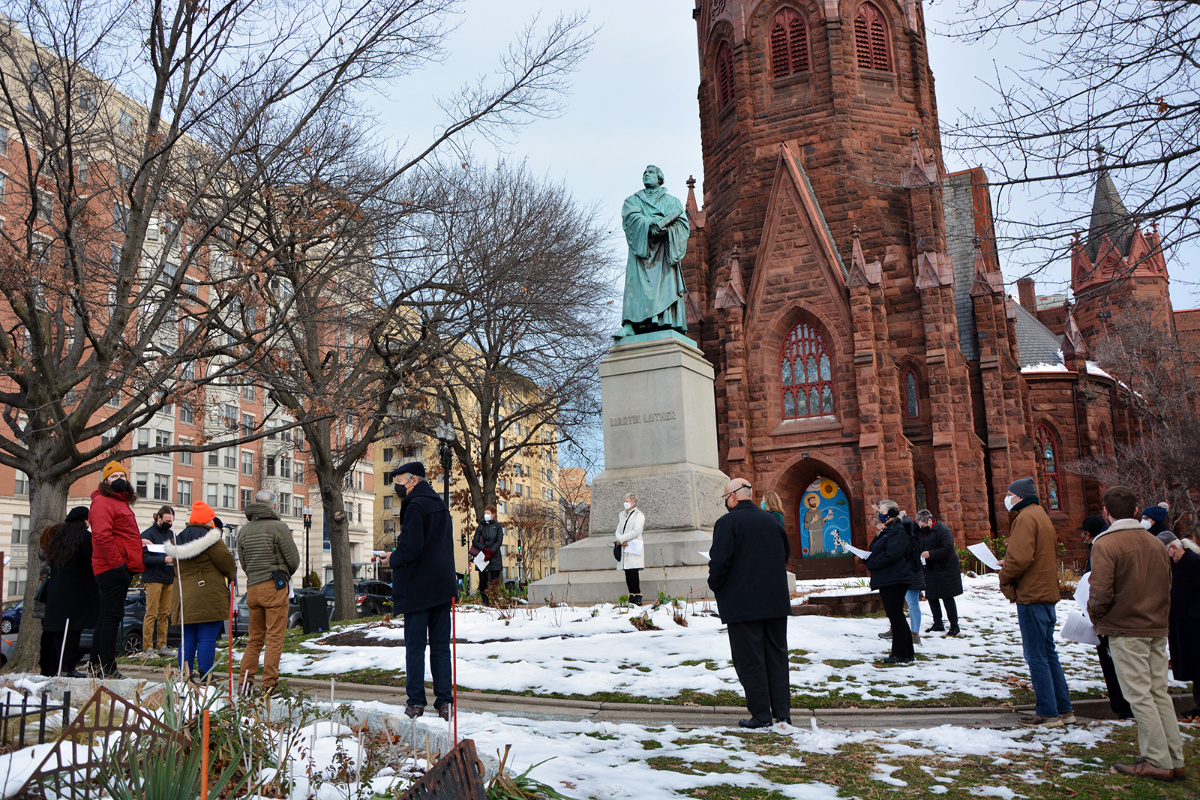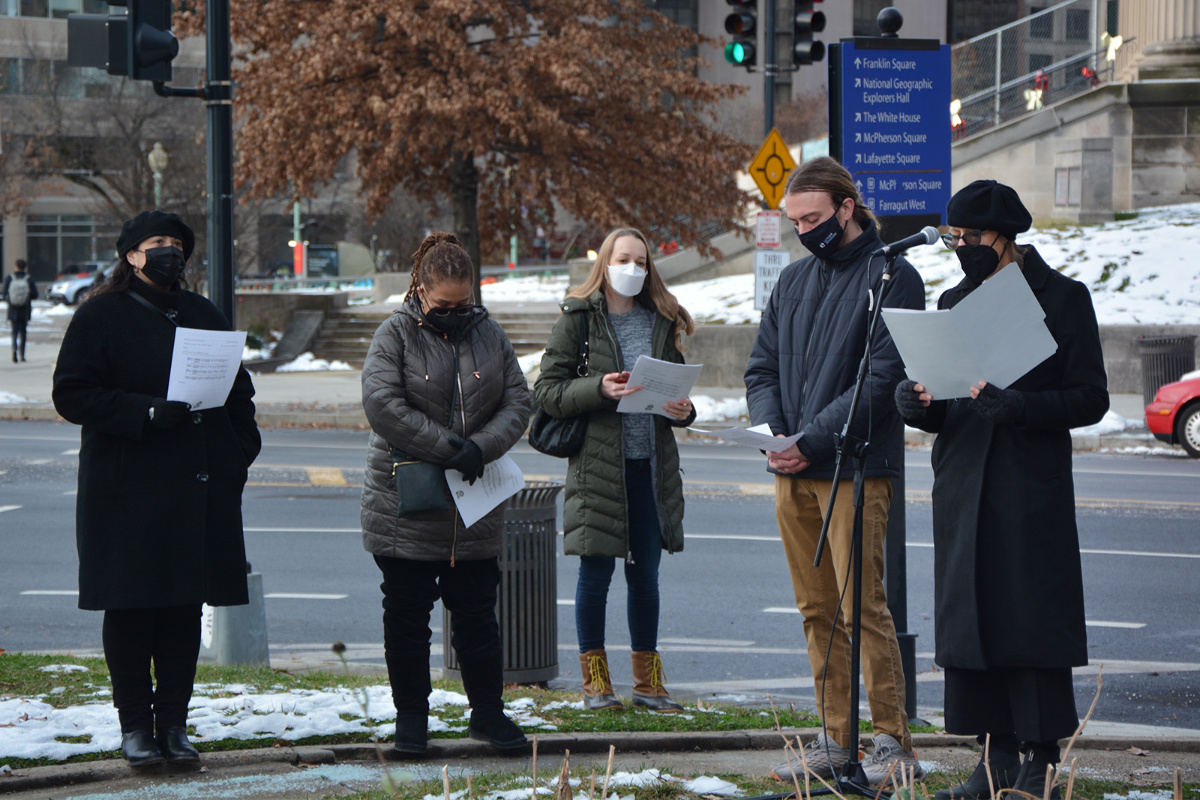Washington DC, US
RNS
On the morning of 6th January, 2021, an interfaith group of religious leaders huddled together in downtown Washington. As they stood in a circle around a Black Lives Matter sign erected just outside Luther Place church, the group mustered a prayerful protest against those descending on the city to dispute the results of the 2020 presidential election.
A few minutes after the faith leaders began their vigil, men wearing Trump-branded gear barged into the middle of their circle and mockingly reenacted the death of George Floyd. It was a sign of things to come: A few hours later, masses of Trump supporters staged an insurrection down the street at the US Capitol.

A group of religious leaders gathers at Luther Place church, on 6th January, 2022, for an interfaith vigil on the first anniversary of the Capitol insurrection. PICTURE: RNS/Jack Jenkins
A year later, some of the same faith leaders reconvened outside Luther Place on Thursday morning to remember that day, when their gaggle of faithful was one of the only visible counterdemonstrations in the city.
Rev Karen Brau, pastor of Luther Place, told the small crowd gathered in the melting snow that despite the harassment they experienced a year prior, the faith leaders never stopped their prayerful witness.
“Our praying did not cease,” she said.
As she recounted the story of the encounter, she pointed out that “later in the day an insurrection was perpetrated at the Capitol – a building that is often called a sacred place for our democracy.”
Thursday’s Luther Place interfaith vigil was one of many observances planned in or around DC on this day, some of them ideologically at odds with one another. A vigil on the National Mall near the Reflecting Pool, organized by more than 100 liberal organizations including several faith groups, was set for 4:45 p.m. to denounce last year’s insurrection. A few miles away, at the D.C. jail, another group planned to protest the imprisonment of those charged in the insurrection. House Speaker Nancy Pelosi announced last week a series of livestreamed events throughout the day, including a “prayerful” vigil and testimonials.
At Luther Place, Brau noted that just like last year, Jan. 6 is when many Christians celebrate Epiphany, with some marking the day by blessing sacred spaces.
“Today, outside in the snow, on the sidewalk and in the emerging mud, we are part – you are part – of blessing this space,” she said.
Many things have changed since last year. Gone is the weathered Black Lives Matter sign. At the time, it was a replacement for a banner stolen and destroyed the night of 12th December, 2020, when members of the extremist group Proud Boys – several of whom have since been charged in connection with their alleged role in the insurrection – marauded through the city. They tore down signs from at least three other area churches as well – including Black Lives Matter banners belonging to two nearby historic Black churches, one of which was set ablaze. The head of the Proud Boys, Enrique Tarrio, is currently serving a five-month jail sentence in part for his role in the sign-burning.
Luther Place has now repurposed the old sign and installed two more banners with the same slogan on the side of the church.
But for all the changes, the scars of 6th January remain.

Rev Karen Brau, right, speaks during an interfaith vigil on the first anniversary of the Capitol insurrection, on 6th January, 2022, at Luther Place church in Washington. PICTURE: RNS/Jack Jenkins
“Those individuals desecrated this holy ground,” Bishop Leila Ortiz, head of the Metropolitan Washington, DC, Synod of the Evangelical Lutheran Church in America, told the crowd.
“As one who has experienced firsthand the hateful nature of racism and white supremacy, as one who should not have been surprised by this new behavior, I stood paralysed.”
In a separate interview with Religion News Service, Ortiz said it wasn’t until weeks after the harassment incident that she realised how much it traumatised her. She characterised the actions of the men who disrupted their vigil as an example of “spiritual warfare”, explaining the “evil” they represented was replicated on a larger scale when an angry mob stormed the US Capitol later that day.
“We really did witness evil manifest before us – not only in this particular sacred space, but in our nation,” she said. “Our democracy was threatened.”
But despite her experience, she said, the incident has ultimately inspired her to throw herself deeper into faith-led advocacy.
“Even though I speak of paralysis, what that [event] did was launch me into the spirit of being an activist,” she said.
“I find it prophetic that within the few God was present – not only to to say ‘absolutely not – you will not be the only voice in this space declaring over our country what you determine will happen’ – but that there is an interfaith community that refuses to let you be the only voice in this space and time.”
We rely on our readers to fund Sight's work - become a financial supporter today!
For more information, head to our Subscriber's page.
Even as they remembered the past, speakers at the vigil pointed to more immediate concerns. Participant Benjamin Brown recounted a moment in December 2020 when he said a band of extremists threatened to interrupt a different prayer service outside Luther Place. As the extremists approached, he said, an elderly church member turned to face them. Gripping her cane, she stared down the extremists as she led the group in singing the hymn We Shall Not Be Moved.
Brown drew connections between that incident and the insurrection, then pivoted to a more immediate concern: the ongoing debate on Capitol Hill over whether to pass legislation to protect voting rights.
He urged lawmakers to “protect voting rights in our fragile, imperfect democracy”.
Brown’s message was echoed a few minutes later by Vice President Kamala Harris, whose motorcade barreled past the church just as the vigil concluded. She, too, would call on the Senate to pass voting rights legislation in a speech at the US Capitol.
In an interview, Brau noted the the need for congregations like hers to offer what help they can to other faith communities – locally and otherwise – as they “organise the power of the sacred … into the common good.”
She remains concerned about other events scheduled to take place in Washington later this month, and generally “threats of public violence”. But come what may, Brau insisted that she and others will strive to find meaning even in experiences such as those that took place last 6th January.
“The hope is that there is some reorientation to acknowledge the trauma,” she said, “and then, in some ways, use the harsh reality of where we are in our public life to discern: What are the steps that you’re going to take in your life and in the communities that you’re part of?”
In the meantime, Brau and others are determined to continue their prayerful witness. As the vigil drew to a close, a lone singer stood before the microphone and belted out a hymn, Lord, Listen to Your Children Praying.





